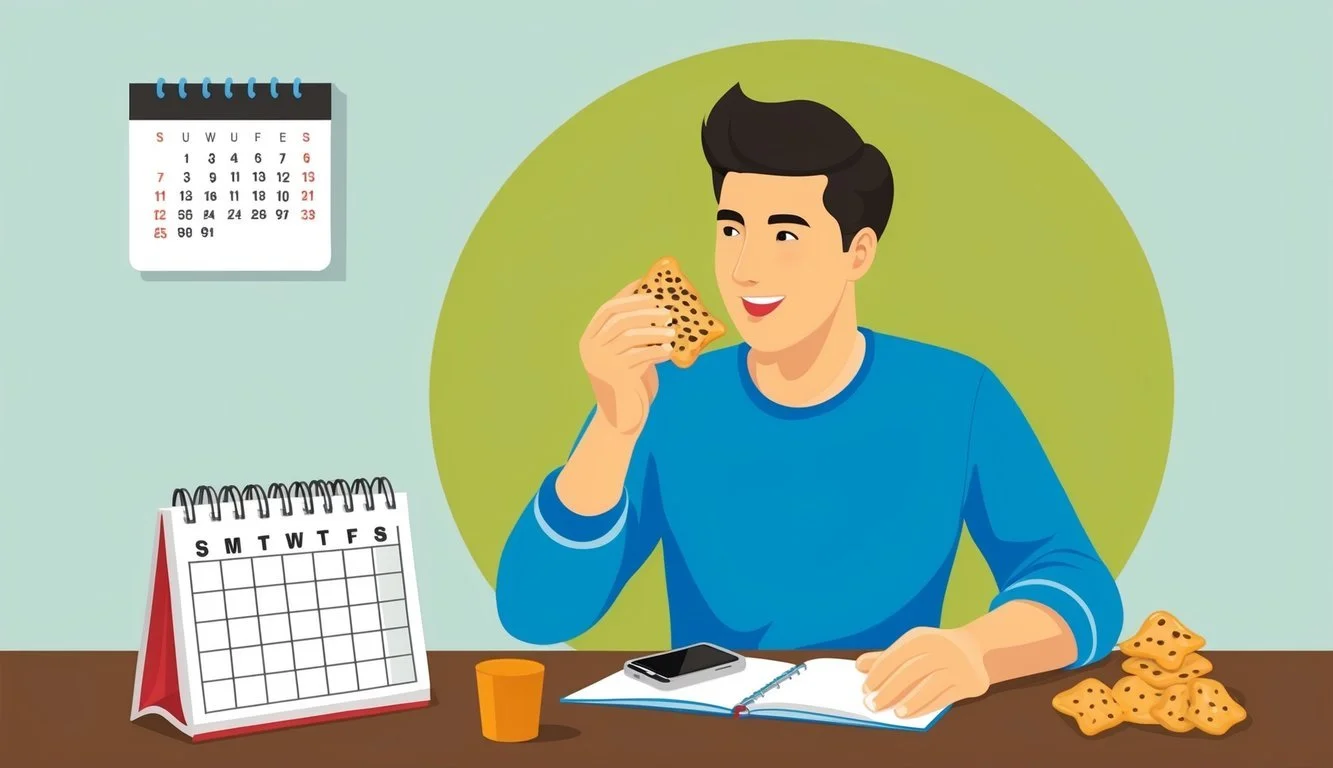Procrastination vs. Impulsivity: Uncovering Their Surprising Similarities
Procrastination and impulsivity, two seemingly distinct behaviors, share intriguing similarities. Research suggests these traits may have common genetic roots, shedding light on their intertwined nature. Studies have found a genetic correlation between procrastination and impulsivity, indicating they likely stem from similar evolutionary origins.
Both traits involve difficulties with self-control and a tendency to prioritize short-term rewards over long-term goals. People who procrastinate often delay important tasks in favor of more immediately gratifying activities, mirroring the impulsive tendency to act without considering future consequences. This overlap in behavioral patterns points to shared underlying mechanisms.
Understanding the connection between procrastination and impulsivity can provide valuable insights for those seeking to improve their productivity and decision-making. By recognizing the genetic link between these traits, individuals may develop more effective strategies to manage both procrastination and impulsive behaviors, ultimately leading to better goal achievement and personal growth.
Defining Impulsivity and Procrastination
Impulsivity and procrastination are distinct yet interconnected behavioral tendencies that impact decision-making and task completion. Both traits can significantly influence an individual's productivity and overall well-being.
Understanding Impulsivity
Impulsivity refers to the tendency to act without forethought or consideration of potential consequences. It involves quick, unplanned reactions to internal or external stimuli.
Impulsive individuals often struggle with self-control and may engage in risky behaviors. They frequently seek immediate gratification and have difficulty delaying rewards.
Key characteristics of impulsivity include:
Rapid decision-making
Limited planning or consideration of outcomes
Difficulty resisting urges or temptations
Increased risk-taking behavior
Impulsivity can manifest in various aspects of life, such as financial decisions, relationships, and work performance.
Understanding Procrastination
Procrastination is the act of delaying or postponing tasks despite knowing the negative consequences. It involves voluntarily putting off important activities in favor of more immediately rewarding or less challenging ones.
Procrastinators often struggle with time management and may experience heightened stress as deadlines approach. They frequently engage in task avoidance and may rationalize their delays.
Common features of procrastination include:
Difficulty initiating or completing tasks
Prioritizing short-term comfort over long-term goals
Feeling overwhelmed by responsibilities
Experiencing guilt or anxiety about unfinished work
Procrastination can impact academic performance, career advancement, and personal relationships.
Psychological Foundations
Impulsivity and procrastination share common psychological roots that influence cognitive processes, emotional regulation, and behavioral outcomes. These interconnected factors shape how individuals approach tasks and make decisions.
Cognitive Processes
Impulsivity and procrastination both involve difficulties in executive functioning. This includes challenges with planning, prioritizing, and focusing attention. Individuals may struggle to resist immediate gratification in favor of long-term goals.
Working memory deficits can contribute to both traits. People may have trouble holding multiple pieces of information in mind while making decisions. This can lead to hasty choices or avoidance of complex tasks.
Time perception plays a role in both impulsivity and procrastination. Those affected may underestimate the time needed to complete tasks or overestimate the time available. This can result in rushed decisions or delayed action.
Emotional Regulation
Anxiety and stress often underlie both impulsive and procrastinating behaviors. Fear of failure or perfectionism can trigger avoidance or rash actions. Individuals may use these behaviors as maladaptive coping mechanisms.
Mood regulation difficulties are common in both traits. People may act impulsively or procrastinate to alleviate negative emotions or seek positive ones. This short-term emotional relief can reinforce the behaviors.
Low frustration tolerance is another shared factor. Those who struggle with impulsivity or procrastination may have difficulty persisting through challenging or boring tasks. They may seek immediate rewards or distractions instead.
Behavioral Outcomes
Both impulsivity and procrastination can lead to poor time management. Individuals may struggle to allocate time effectively, resulting in missed deadlines or rushed work. This can create a cycle of stress and further avoidance.
Task initiation is often challenging for those with these traits. They may delay starting important projects or jump into activities without proper planning. This can lead to incomplete work or suboptimal results.
Decision-making is affected in both cases. Impulsive individuals may make choices without considering consequences, while procrastinators may avoid decisions altogether. Both can result in missed opportunities or regrettable actions.
Consequences and Impacts
Impulsivity and procrastination can have far-reaching effects on various aspects of life. These traits often result in missed opportunities, increased stress, and diminished performance across personal, professional, and academic domains.
On Personal Life
Impulsivity and procrastination can strain relationships and lead to financial difficulties. Impulsive individuals may make rash decisions, resulting in unnecessary purchases or risky behaviors. This can create tension with family and friends.
Procrastinators often experience heightened stress as deadlines approach. They may sacrifice sleep and personal time to complete delayed tasks, negatively impacting their physical and mental health.
Both traits can hinder personal growth and goal achievement. Impulsive people may struggle to stick to long-term plans, while procrastinators frequently delay important life decisions or self-improvement efforts.
On Professional Life
In the workplace, impulsivity can lead to hasty decisions and poor judgment. Employees may act without considering consequences, potentially damaging team dynamics or client relationships.
Procrastination often results in missed deadlines and subpar work quality. This can harm an individual's reputation and limit career advancement opportunities.
Both traits can reduce productivity and efficiency. Impulsive workers may frequently switch tasks without completion, while procrastinators struggle to manage time effectively.
Employers may view these behaviors as indicators of unreliability or lack of commitment, potentially leading to negative performance reviews or job loss.
On Academic Performance
Students with impulsive tendencies may struggle to focus during lectures or study sessions. They might rush through assignments without careful consideration, resulting in careless errors and lower grades.
Procrastination in academic settings often leads to last-minute cramming and poorly prepared work. This can result in increased stress, lower test scores, and incomplete assignments.
Both traits can hinder effective learning. Impulsive students may not take the time to fully grasp concepts, while procrastinators may miss out on valuable feedback opportunities by submitting work late.
These behaviors can negatively impact GPA, scholarship opportunities, and future educational prospects. They may also contribute to increased anxiety and decreased self-confidence in academic abilities.
Similarities in Origins
Impulsivity and procrastination share common biological and environmental roots. These traits are intertwined through genetic factors and influenced by similar external circumstances.
Biological Factors
Genetic studies have revealed a link between impulsivity and procrastination. Research published in Psychological Science found that these traits stem from similar evolutionary origins. The genetic connection suggests a shared biological basis for both behaviors.
Brain structure and neurotransmitter activity play roles in both impulsivity and procrastination. The prefrontal cortex, responsible for executive functions like decision-making and self-control, is involved in regulating both traits.
Dopamine, a neurotransmitter associated with reward and motivation, affects impulsive actions and procrastination tendencies. Variations in dopamine receptor genes may influence an individual's likelihood to exhibit these behaviors.
Environmental Factors
External influences contribute to the development of both impulsivity and procrastination. Parenting styles and early childhood experiences shape self-regulation skills, impacting both traits.
Educational environments and work settings can reinforce or discourage impulsive and procrastinating behaviors. Time pressures, stress, and reward systems in these contexts affect how individuals manage tasks and impulses.
Social factors, such as peer influence and cultural norms, play a role in shaping both impulsivity and procrastination tendencies. Societal expectations and pressures can either exacerbate or mitigate these traits.
Technology and modern lifestyles contribute to both impulsivity and procrastination. Constant distractions and instant gratification from digital devices can reinforce impulsive behaviors and delay task completion.
Coping Strategies
Effective coping strategies can help manage both impulsivity and procrastination. These techniques focus on improving self-control, time management, and mental well-being.
Time Management Techniques
The Pomodoro Technique is a popular time management method. It involves working in 25-minute focused intervals, followed by short breaks. This approach helps maintain concentration and reduces the urge to procrastinate or act impulsively.
Task prioritization is another crucial skill. Creating a daily to-do list and ranking tasks by importance can provide structure and direction. This minimizes decision fatigue and the tendency to put off important work.
Time-blocking involves scheduling specific activities for set periods. This technique helps allocate time efficiently and reduces the likelihood of impulsive task-switching or procrastination.
Cognitive Behavioral Approaches
Cognitive restructuring is a key component of managing impulsivity and procrastination. This involves identifying and challenging negative thought patterns that lead to problematic behaviors.
Thought records can be useful tools. They help individuals track situations, emotions, and thoughts that trigger impulsive actions or procrastination. By analyzing these patterns, people can develop more constructive responses.
Behavioral experiments allow individuals to test their assumptions about tasks they tend to avoid. This approach can help overcome fears and build confidence in tackling challenging work.
Mindfulness and Self-Regulation
Mindfulness meditation can improve impulse control and focus. Regular practice enhances awareness of thoughts and emotions, allowing for more deliberate decision-making.
Deep breathing exercises are simple yet effective tools for managing impulsive urges. They activate the body's relaxation response, reducing stress and improving self-regulation.
Body scan techniques involve systematically focusing attention on different parts of the body. This practice can increase body awareness and help individuals recognize physical cues related to impulsivity or procrastination.
Research Insights
Recent studies have shed new light on the genetic and neurological connections between impulsivity and procrastination. Longitudinal analyses have further clarified how these traits interact and evolve over time.
Recent Studies
Genetic research has revealed a strong link between impulsivity and procrastination. One study found a genetic correlation of 1.0 between these traits, suggesting shared evolutionary origins. This finding supports the idea that impulsivity and procrastination stem from similar biological mechanisms.
Neuroimaging studies have identified overlapping brain regions involved in both impulsive behaviors and procrastination tendencies. The prefrontal cortex, which plays a key role in executive function and decision-making, shows altered activity in individuals prone to both traits.
A meta-analysis found a moderate correlation (r = 0.41) between impulsivity and procrastination measures. This indicates a significant relationship, though not a complete overlap between the constructs.
Longitudinal Analysis
Long-term studies have tracked the development of impulsivity and procrastination from adolescence into adulthood. Results show that both traits tend to decrease with age, but at different rates.
Impulsivity often peaks in late adolescence and declines more rapidly in early adulthood. Procrastination, while also decreasing, tends to persist longer into adulthood for many individuals.
Research has identified shared risk factors that predict both impulsivity and procrastination over time. These include difficulties with emotion regulation, low conscientiousness, and certain environmental influences like parenting styles.
Interventions targeting either impulsivity or procrastination have shown some cross-over effects. Strategies that improve impulse control often lead to reductions in procrastination behaviors as well.
Theoretical Perspectives
Impulsivity and procrastination share connections in psychodynamic and behavioral frameworks. These perspectives offer insights into the underlying mechanisms and motivations behind both traits.
Psychodynamic Theory
Psychodynamic theory views impulsivity and procrastination as defense mechanisms against anxiety. Both traits serve to protect the ego from perceived threats or uncomfortable emotions. Impulsive individuals may act quickly to avoid facing difficult decisions or feelings.
Procrastinators delay tasks to temporarily escape anxiety associated with potential failure or judgment. This theory suggests that both behaviors stem from unresolved childhood conflicts or inadequate parental nurturing.
Psychodynamic approaches emphasize exploring unconscious motivations and past experiences to address these traits. Therapy aims to increase self-awareness and develop healthier coping strategies for managing anxiety and emotional discomfort.
Behavioral Theory
Behavioral theory focuses on learned patterns of behavior and environmental reinforcement. From this perspective, impulsivity and procrastination are habits developed through repeated experiences and consequences.
Impulsive actions may be reinforced by immediate gratification or relief from negative emotions. Procrastination can be reinforced by short-term stress reduction when avoiding tasks.
Both traits may persist due to intermittent reinforcement schedules. Behavioral interventions target these patterns through:
Identifying triggers
Modifying environmental cues
Implementing reward systems
Practicing alternative behaviors
Cognitive-behavioral techniques aim to reshape thought patterns and develop self-regulation skills. Gradual exposure to anxiety-provoking tasks helps individuals build confidence and reduce avoidance behaviors.
Conclusion
Impulsivity and procrastination share notable similarities in their underlying mechanisms and effects on behavior. Both involve difficulties with self-regulation and impulse control.
Research indicates overlapping neural activity in the dorsolateral prefrontal cortex for these traits. This brain region plays a key role in executive functioning and decision-making.
Genetic studies have also revealed connections between impulsivity and procrastination tendencies. The traits appear to have some common biological and hereditary components.
Emotion regulation challenges link these behaviors as well. Individuals may engage in impulsive actions or delay tasks as maladaptive coping strategies for managing difficult emotions.
Motivational factors influence both impulsivity and procrastination. Low motivation or aversion to certain tasks can trigger avoidant or impulsive responses.
Understanding these shared elements provides insights for developing more effective interventions. Strategies targeting self-regulation, emotional management, and motivation may help address both impulsive and procrastinating behaviors simultaneously.
Recognizing the nuanced relationship between impulsivity and procrastination aids in creating more comprehensive approaches to behavior modification and personal development.





